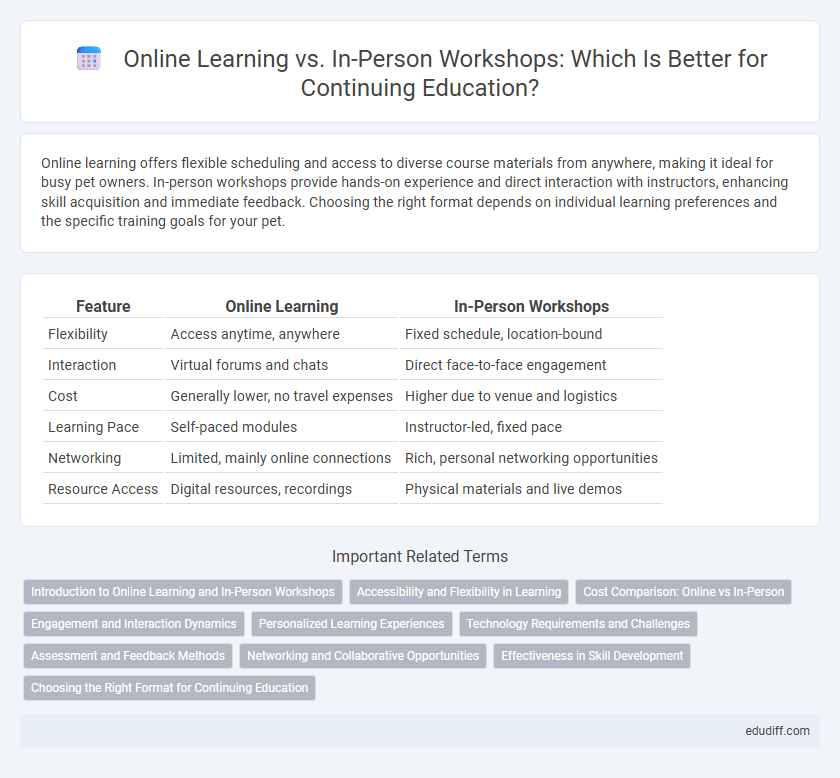Online learning offers flexible scheduling and access to diverse course materials from anywhere, making it ideal for busy pet owners. In-person workshops provide hands-on experience and direct interaction with instructors, enhancing skill acquisition and immediate feedback. Choosing the right format depends on individual learning preferences and the specific training goals for your pet.
Table of Comparison
| Feature | Online Learning | In-Person Workshops |
|---|---|---|
| Flexibility | Access anytime, anywhere | Fixed schedule, location-bound |
| Interaction | Virtual forums and chats | Direct face-to-face engagement |
| Cost | Generally lower, no travel expenses | Higher due to venue and logistics |
| Learning Pace | Self-paced modules | Instructor-led, fixed pace |
| Networking | Limited, mainly online connections | Rich, personal networking opportunities |
| Resource Access | Digital resources, recordings | Physical materials and live demos |
Introduction to Online Learning and In-Person Workshops
Online learning offers flexible access to educational content, allowing learners to study at their own pace through digital platforms such as video lectures, quizzes, and discussion forums. In-person workshops provide hands-on experience and immediate feedback via face-to-face interaction with instructors and peers, fostering networking and collaborative learning. Both methods serve distinct learning preferences and objectives, with online formats emphasizing convenience and scalability, while workshops emphasize practical skill development and real-time engagement.
Accessibility and Flexibility in Learning
Online learning offers unparalleled accessibility by allowing students to engage with course materials anytime and anywhere, breaking geographical and scheduling barriers. In-person workshops provide structured environments that support hands-on experiences but often require fixed attendance times and locations. The flexibility of online platforms caters to diverse learning paces and needs, enhancing inclusivity and convenience for a wider audience.
Cost Comparison: Online vs In-Person
Online learning significantly reduces overall costs due to the elimination of travel, accommodation, and physical materials expenses, making it more budget-friendly for many learners. In-person workshops often incur higher fees from venue rentals, instructor travel, and printed resources, increasing the total cost of attendance. Businesses and individuals seeking cost-effective training options frequently choose online platforms to maximize value while minimizing financial outlay.
Engagement and Interaction Dynamics
Online learning offers flexible engagement through multimedia tools and real-time feedback, enhancing personalized interaction despite physical distance. In-person workshops foster dynamic group activities and spontaneous discussions, creating a more immersive and socially engaging environment. Both formats leverage unique interaction dynamics to optimize learner participation and knowledge retention.
Personalized Learning Experiences
Personalized learning experiences in online platforms utilize adaptive algorithms to tailor content based on individual performance and preferences, enhancing engagement and retention. In-person workshops offer real-time feedback and hands-on activities that cater to diverse learning styles through direct interaction with instructors and peers. Both modalities emphasize customization, but online learning leverages technology for scalable personalization while workshops provide immediate, tactile learning adjustments.
Technology Requirements and Challenges
Online learning demands reliable internet connectivity, compatible devices, and proficiency with digital platforms, which can present challenges for participants with limited technological resources or skills. In-person workshops reduce dependency on technology but require physical attendance, which may limit accessibility for remote learners. Both modalities necessitate tailored support systems to address technological barriers and ensure effective engagement.
Assessment and Feedback Methods
Online learning platforms utilize automated quizzes and instant digital feedback to provide real-time assessment, enhancing learner engagement and knowledge retention. In-person workshops rely heavily on direct observation and interactive discussions, allowing facilitators to offer personalized feedback tailored to individual participants' needs. Both approaches benefit from integrating formative assessments, but online methods excel in scalability, while in-person settings offer deeper qualitative insights.
Networking and Collaborative Opportunities
In-person workshops provide superior networking and collaborative opportunities by facilitating face-to-face interactions and immediate feedback, essential for building professional relationships and teamwork skills. Online learning platforms offer virtual collaboration tools like discussion forums and video conferencing, yet they often lack the spontaneous engagement and personal connection found in physical settings. Effective networking in online environments requires intentional effort, whereas in-person workshops naturally foster dynamic group interactions and trust-building.
Effectiveness in Skill Development
Online learning platforms leverage interactive multimedia and adaptive algorithms to enhance skill acquisition, providing personalized pacing conducive to diverse learning styles. In-person workshops facilitate immediate feedback and hands-on practice, fostering deeper engagement through real-time collaboration and networking opportunities. Studies indicate blended approaches combining both methods yield higher retention rates and more comprehensive skill development outcomes.
Choosing the Right Format for Continuing Education
Choosing the right format for continuing education depends on individual learning preferences, course content, and flexibility requirements. Online learning offers accessibility and self-paced study, ideal for professionals balancing work and education, while in-person workshops provide hands-on experience and direct interaction with instructors and peers. Evaluating factors such as time constraints, learning style, and the need for practical application ensures the most effective and engaging educational experience.
Online Learning vs In-Person Workshops Infographic

 edudiff.com
edudiff.com